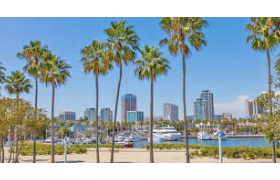After years of calls to lower cannabis taxes in the city, Long Beach could do just that in next year’s proposed budget, which calls for a 1% reduction for retail sales across the board with some businesses able to achieve a 4% cut if they meet certain employment requirements.
George Pinto, owner of The Mericana dispensary in West Long Beach, says the move is a step in the right direction, and he’s hopeful that it will allow him to reopen his business, which he temporarily closed in May after being open for a little over two years.
“One percent, two percent, anything helps but you need it as soon as possible,” Pinto said.
Pinto, like other retail dispensary owners, has been pushing the city to lower its excise tax rate, which adds an 8% tax for adult use cannabis sales and 6% for medicinal sales. Those taxes are tacked on top of the city’s regular sales tax rate of 10.5% and state taxes.
The combination of taxes has put retailers in a difficult position, Pinto said. They can either raise prices to account for the taxes and risk driving people elsewhere, like the illicit market, or they can try to survive on thin margins in hopes of keeping people walking through their doors.
Some months, Pinto said he was losing $20,000 to $30,000, and he estimated that he lost over a quarter-million before making the difficult decision to close his doors.
The tax revenue, though, has been a lifeline for the city, which is grappling with how it will make up for the loss of oil tax money in the future and was dealt a blow last year when the state Supreme Court opted not to hear its appeal over a water fund transfer, ending its practice of sending millions from the Utilities Department to the general fund each year.
Since most retail outlets fully opened in 2019, cannabis taxes have generated between about $10 million and $13 million annually. Nearly 76% of that came from adult-use sales at dispensaries in the city in 2022, according to city data.
Read more at




















